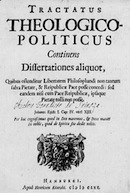
Source: Theologico-Political Treatise - Chapter V - of the ceremonial law
Spinoza's Chapter 5 – of ceremonial law and the 10 commandments (Page 1)

Spinoza maintains that he has shown in the last chapter that the Divine Law shows the way to the good life and that all men not only can know it. Also it is so much a part of human nature that it must be ingrained in the human mind. He goes so far as to call it innate (see Comment below).
But with regard to the ceremonial observances ordained by the Old Testament, they were for the Hebrews only. They are not part of the Divine Law and have nothing to do with blessedness and virtue. Spinoza says that theologians have little use for reasoned arguments so he will show from scripture how and why the ceremonies helped to preserve Jewish life. He proceeds to quote passages from the Bible to show that ceremonies are emotionally and socially beneficial but have no other value. They do not add to understanding of (Deus sive Natura) and therefore do not lead to blessedness.
The ten commandments are laws laid down to produce a stabile society and are not a reasoned doctrine. They were aimed at keeping the Jews under restraint. As for Christ, Spinoza repeats that Christ was sent into the world, not to preserve the state nor to lay down laws, but solely to teach the universal moral law.
Comment:
By Divine Law Spinoza has previously said the men seek to know (Deus sive Natura) as natura naturans (Nature as becoming, a process). It is not only beneficial or useful to their existence but it is also the way toward blessedness.
I have directly quoted the text (above) on Christ. The language (unless altered by his Christian friends) provokes questions I would have liked to ask Spinoza – Christ was sent? By whom? By what? How? Is it possible that his friends where not so firmly convinced that the universe was the Deity that Spinoza describes and that they were thinking otherwise. Could they be responsible for the language? Or did Spinoza speak of Christ in this way to appease them? Would he veer from his vow to speak the truth?
The commentators on Spinoza I have used avoid discussing this issue though they have noted his high opinion of Christ. Spinoza speaks of Christ in a letter to Henry Oldenburg, secretary to the Royal Society in London (quoted later). One bloger (http://branemrys.blogspot.com/2008/03/spinozas-christ.html) speculates that Spinoza's high opinion of Christ was due to the fact that Spinoza saw in him a fellow Jewish reformer.